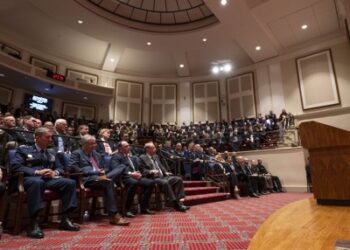From Dogecoin’s initial descent to the longest government shutdown in U.S. history, defense contractors are currently experiencing varied impacts from policy changes during the first phase of the second Trump administration. Larger defense companies are faring well, while smaller companies—those that the White House and Pentagon are eager to engage—are facing more challenges.
Leidos, ranked No. 15 among global defense companies, is reporting significant growth this year. During the company’s third-quarter earnings call on a Tuesday, CEO Thomas Bell announced a revenue increase of approximately 7 percent, amounting to $4.5 billion compared to the previous year. Bell indicated that most of Leidos’ programs remain unaffected by the ongoing government shutdown due to their critical nature to government missions and their funding being tied to “discretionary budgets.”
Leidos’ focus on defense aligns with key priorities of the current administration, which include missions related to Golden Dome defense, air traffic control modernization, border security, and maritime autonomy. Other large defense contractors, such as Leonardo DRS, General Dynamics, and RTX, reported similarly positive results in their recent earnings calls. However, some executives expressed concerns that the prolonged shutdown has stalled contracting negotiations, which could become increasingly problematic if it persists.
Efforts are underway to resolve the shutdown, with the Senate scheduled to vote on a deal aimed at ending the impasse on Friday. However, there remain uncertainties about when the government will reopen and the subsequent effects on defense contractors, which are likely to experience complications in various areas.
The government shutdown has resulted in significant disruptions, including delays in security clearance processes, pausing pilot training programs, and hindering intelligence gathering and maintenance work for military platforms, as stated by the Professional Services Council, a trade group representing government contractors. Concerns are growing, as the National Defense Industrial Association has urged Congress to end the shutdown and approve budget funding for 2026, cautioning against the potential negative impacts, such as delayed schedules and supply chain issues, due to missed payments.
David Norquist, president of the NDIA and former deputy defense secretary, wrote to congressional leaders on October 29, stating that while many larger defense contractors planned to handle work without pay during a short shutdown, this strategy is unsustainable in the long term.
The NDIA represents over 1,500 companies, primarily consisting of small businesses, many of which struggle with limited cash flow during a shutdown. The longer the shutdown continues, the more pronounced its impacts on the U.S. defense industrial base will become. Eric Fanning, president and CEO of the Aerospace Industries Association, echoed the urgency to end the shutdown, explaining that it disrupts new programs, stifles innovation, and slows down the Federal Aviation Administration (FAA).
Reactions regarding the shutdown’s immediate effects vary among defense tech company founders. Some view it as a minor irritation, while others regard it as disruptive to contract discussions or ongoing awards. Potentially missed payments are a critical concern for newer companies unfamiliar with the unpredictable nature of government funding. The government will reopen under a continuing resolution unless a full budget for 2026 is passed, which poses additional challenges for defense companies.
Cephalon Technologies II (CX2), a counter-drone tech company based in El Segundo, California, reported that, aside from slowed communications due to limited contracting staff, business continues as normal because much of their funding was approved under a prior comprehensive bill. However, programs like the Small Business Innovation Research (SBIR) awards are experiencing delays.
While some larger firms are looking towards international markets to mitigate their reliance on U.S. budgets, startups may find themselves in a precarious position as they often lack the experience and resilience to navigate the fluctuating landscape of government funding. There is concern that companies dependent on research and development funding will face a prolonged wait until the shutdown concludes.
The uncertainty around funding can delay improvements in products, particularly regarding customer feedback loops, which are vital for development. Even after the government reopens, the absence of a budget for 2026 will necessitate continued adaptation to funding constraints, with risks of halted contracts looming for startups that may be entering the defense market for the first time.













